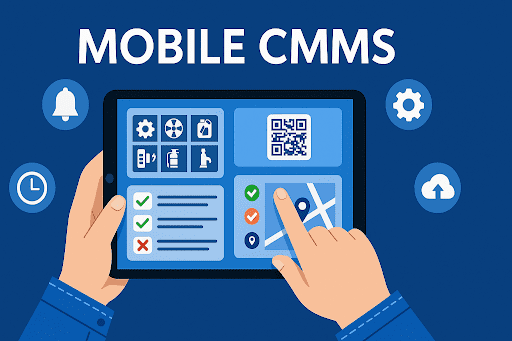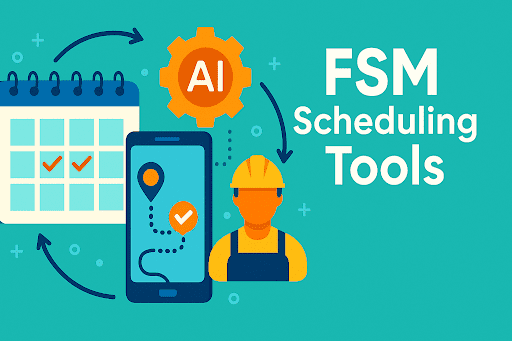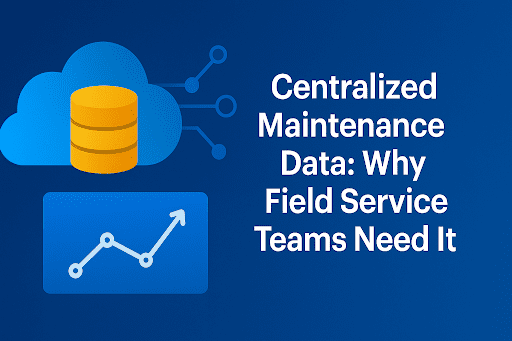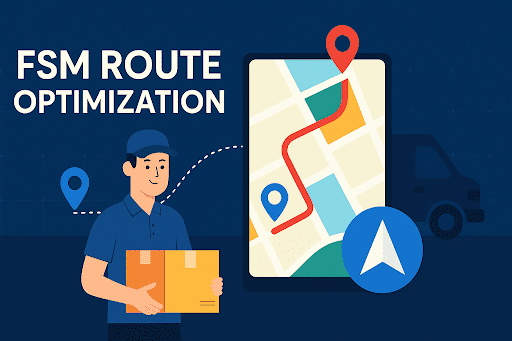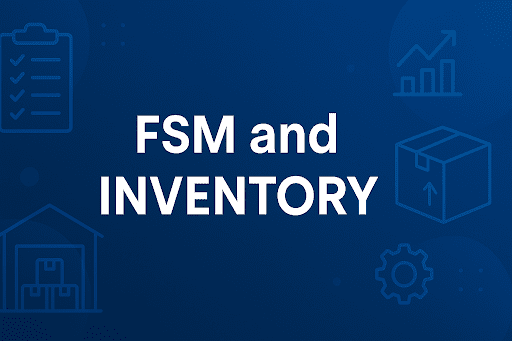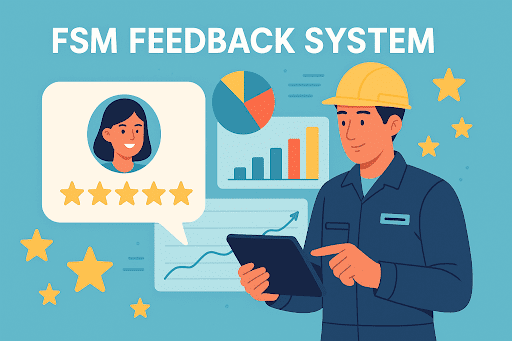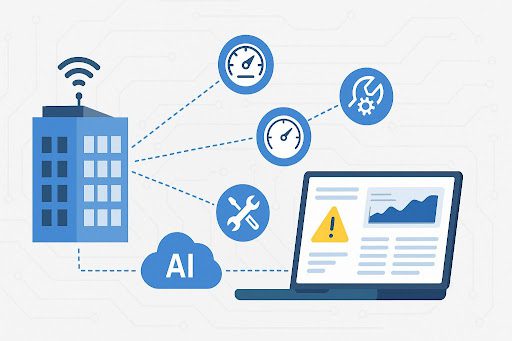 BACK TO Blog
BACK TO Blog
Asset Rental Management
Field Service
Efficient Operations Using Field Service Management Tools
- May 09, 2025
- DreamzCMMS Team
- 10 minutes read

- May 09, 2025
- DreamzCMMS Team
- 10 minutes read
Service-based companies have to provide efficiency, accuracy, and speed in every interaction in fast-paced, customer-oriented economy. Whether it's scheduling technicians, dispatching urgent jobs, tracking inventory, or capturing service data on the move, managing field operations can fast become overwhelming without the right tools. Field service management software is useful in that situation.
Field Service Management Software provides a centralized platform to automate and simplify every facet of your field operations. From real-time job tracking and technician scheduling to remote workforce monitoring and customer appointment management, these tools guarantee that every task is completed on time, with the right resources, and to the highest standards.
This blog explores in depth how Field Service Management Tools improve operational efficiency. You will see how tools such as Service Dispatch Management, Work Order Management Software, and Mobile Field Service Software can transform service workflows. Whether your business is HVAC, utilities, telecom, or equipment rental, this guide will enable you to know how to achieve total visibility and control over your field operations.
Looking to streamline your field service operations?Explore how Field Service Management Software from DreamzCMMS can help you simplify scheduling, reduce response times, and improve customer satisfaction. |
What Are Field Service Management Tools?
Comprehensive digital platforms meant to enable companies to effectively control every facet of field operations, Field Service Management Tools are from scheduling technicians and dispatching jobs to managing inventory, performance tracking, and sustaining good customer communication, these tools offer a centralized solution that simplifies workflows and guarantees smooth coordination between office personnel and field teams.
These systems are the operational nerve center for service-oriented companies, automating routine tasks, improving communication, and providing real-time visibility into job status, resource allocation, and customer interactions. This greatly lowers manual labor, cuts delays, and boosts general productivity of service teams.
Common Capabilities of Field Service Management Tools:
Here we can see the common capabilities of Field service management tools.
Job Scheduling and Technician Routing
Intelligent job scheduling and technician routing are among the fundamental features of Field Service Management Tools. These tools let service managers allocate duties depending on real-time availability, skill set, location, and priority level. Automated scheduling logic helps businesses to prevent overlaps, minimize technician idle time, and guarantee quick handling of critical tasks. This results in improved use of the workforce and quicker reaction times, both of which are vital for customer satisfaction.
Inventory and Parts Tracking
Good inventory and parts tracking guarantee that technicians have the right tools and replacement parts before going to a job site. Field service management tools provide real-time stock levels, control warehouse and van inventory, and generate alerts for low-stock items by means of integration with inventory databases. Two important performance measures in field service efficiency, return visits brought on by missing components and first-time fix rates, are improved by this feature.
Customer Communication and Feedback
Building trust and guaranteeing good service experiences depend on timely and open customer communication and feedback. FSM tools automate notifications including post-service surveys, job progress updates, technician ETAs, and appointment confirmations. While feedback forms enable companies to always assess and enhance the quality of their services, these automated touchpoints keep consumers informed and involved.
Real-Time Service Updates
Real-time service updates keep field technicians and office managers informed all during the service lifecycle. Changes in the central dashboard are immediately visible as technicians update job statuses on their mobile apps. Managers can reassign tasks as required, monitor progress, and address problems in real time. This enables fast decision-making under dynamic field circumstances and helps to prevent miscommunication.
Location-Based Job Allocation
Using GPS data, location-based job allocation guarantees that technicians are given duties depending on their current or closest location. This function allows quicker on-site response, fuel cost savings, and route efficiency optimization. Field Service Management Tools guarantee no time is lost on pointless travel by means of real-time geolocation, therefore ensuring continuous compliance with service SLAs (Service Level Agreements).
Billing and Documentation
By digitizing invoicing, payments, and job records, Field Service Management Tools simplify billing and documentation. Using the mobile app, the technician may record customer signatures, upload images, and send service notes once a task is finished. The system then automatically creates invoices and syncs accounting software data. It accelerates the billing cycle, reduces paperwork mistakes, and strengthens cash flow.
These tools are sometimes used with larger Field Operations Software systems. Integration with other systems such as ERP, CRM, or asset management platforms guarantees data consistency and eliminates data silos.
Core Features of Field Service Management Tools
Field Service Management Tools include fundamental features which include intelligent job scheduling, real-time technician tracking, work order automation, and mobile access. These features ensure that there is a smooth coordination between the field teams and the office staff, enhancing the response times, accuracy and the overall service quality.
1. Smart Scheduling and Dispatching
Advanced FSM tools assign jobs effectively using AI-based Technician Scheduling Tools, therefore considering technician skill sets, job priority, and proximity. Job allocation based on location guarantees the closest available technician is dispatched for quicker service response.
2. Mobile App for Field Technicians
A committed Mobile App for Field Technicians provides service personnel on-the-go access to job information, service history, papers, and manuals. From the field, they may close tasks, gather customer signatures, and upload job photos.
3. Work Order Management Software
Efficient work order management systems let companies monitor assignments to task completion. It guarantees that every step, from technician comments to components employed, is recorded in real time.
4. Real-Time Job Tracking and Monitoring
Real-time job tracking lets managers see time spent per task, technician location, and job progress. Better decisions and quicker problem resolution follow from this openness.
5. Customer Appointment Management
Online booking systems, automated reminders, and digital confirmations help FSM tools automate Customer Appointment Management. Customers can easily change their appointments and know when to expect professionals.
6. Inventory and Asset Tracking
Integration with inventory systems guarantees field workers real-time access to available stock, tools, and spare parts. This guarantees that technicians come completely ready, prevents delays, and lowers inventory shrinkage. Particularly beneficial for sectors with mobile or high-value assets, companies can obtain real-time visibility of equipment locations, usage patterns, and asset movements when combined with technologies like RFID Asset Tracking Software.
7. Service Dispatch Management
For field coordinators, FSM tools provide real-time Service Dispatch Management. As they happen, dispatchers may track technician activity, reassign tasks, or handle emergencies.
8. Remote Workforce Monitoring
Remote Workforce Monitoring provides supervisors of distributed teams a centralized perspective of every technician's job status, work hours, and locations, therefore promoting responsibility.
Key Benefits of Using Field Service Management Tools
Field Service Management Tools improve operational efficiency through automated job assignment processes and reduced response times and enhanced first-time fix rates. The tools increase customer satisfaction through real-time updates and transparent communication and reliable service delivery.
Key Benefits of Using Field Service Management Tools
FSM tools remove unnecessary steps and manual processes by digitizing routing, scheduling, and reporting. When coupled with service workflow automation, this increases production and efficiency.
2. Enhanced Customer Satisfaction
Features like customer appointment management, automated updates, and accurate arrival times create a professional and trustworthy service experience.
3. Improved First-Time Fix Rates
Access to prior service records, manuals, and part availability via the Mobile App for Field Technicians ensures technicians arrive fully prepared.
4. Optimized Resource Utilization
Through technician scheduling tools and real-time job tracking, managers can allocate work more effectively, reduce idle time, and prevent technician burnout.
5. Lower Operational Costs
Fewer return visits, shorter travel times, and digital recordkeeping lead to significant cost savings. Remote workforce monitoring also reduces overhead associated with office-based supervision.
6. End-to-End Transparency
FSM platforms offer dashboards with detailed KPIs and service metrics. Real-time updates on job progress allow managers to intervene early when issues arise.
Who Needs Field Service Management Tools?
Field Service Management Tools are essential for any business that deploys a mobile or remote workforce. Industries benefiting most include:
- HVAC and Electrical Services
- IT and Telecom Installations
- Facility Maintenance
- Medical Equipment Repair
- Utility Services
- Construction and Equipment Rental
For companies in the equipment leasing space, integrating field service solutions with Asset Rental Management Software enables seamless coordination of maintenance, dispatch, and asset tracking. This ensures maximum uptime of rental assets and delivers superior service to customers.
How to Choose the Right FSM Solution
When selecting a Field Service Management (FSM) solution evaluate your operational challenges and select features that include real-time tracking and mobile access and seamless integration. The software needs to be scalable and user-friendly with excellent customer support to achieve long-term success.
1. Mobile Compatibility
Choose a tool that provides a reliable mobile app for field technicians with offline capabilities for remote locations.
2. Ease of Integration
Your FSM platform should integrate seamlessly with ERP, CRM, accounting, or other enterprise tools for smooth data flow.
3. Scalability
Ensure the system can grow with your team and support hundreds (or thousands) of concurrent field users.
4. User-Friendly Interface
Easy onboarding and training reduce resistance and boost user adoption across technicians and back-office teams.
5. Customization and Automation
Look for tools with strong service workflow automation features to create custom task flows, templates, and alerts.
6. Customer Support and Training Resources
Good FSM providers offer onboarding support, knowledge bases, and hands-on training to ease the transition.
Cloud-Based Field Service Management Tools
Modern FSM tools are mostly cloud-based, offering:
- Real-time data synchronization
- Remote accessibility
- Secure backups
- Instant updates
- Reduced IT maintenance
They are particularly beneficial for teams that operate from multiple regions and need centralized control over decentralized operations.
IoT and FSM: A Powerful Combination
FSM tools are evolving through integration with IoT devices. When equipment sends sensor data to the FSM platform, real-time job tracking and predictive maintenance become automated. For example, if a sensor detects abnormal behavior, the FSM system generates a work order and assigns it through location-based job allocation.
This proactive approach reduces downtime and improves service reliability.
Emerging Trends in Field Service Management Tools
Field Service Management Tools are experiencing new trends which include AI-powered scheduling and predictive maintenance and IoT integration for real-time asset monitoring. These innovations are driving greater efficiency, proactive service delivery, and enhanced customer experiences.
AI-Driven Scheduling
Artificial intelligence improves technician scheduling by forecasting job durations, technician availability, and routing paths.
2. Remote Troubleshooting with AR
Augmented Reality enables field technicians to receive remote support or follow repair guides hands-free through smart glasses.
3. Voice-Based Data Entry
Technicians can update job statuses or log details using voice commands, increasing efficiency in fast-paced environments.
4. Predictive Service Workflow Automation
FSM platforms will continue evolving to trigger maintenance activities based on IoT data and machine learning algorithms.
How DreamzCMMS Powers Field Operations
DreamzCMMS offers a unified suite of Field Service Management Tools with a focus on automation, usability, and scalability. Features include:
- Work Order Management Software for streamlined service lifecycle
- Mobile Field Service Software with real-time syncing
- Remote Workforce Monitoring dashboards for oversight and performance tracking
- Technician Scheduling Tools with drag-and-drop job assignment
- Service Dispatch Management and automated alerts
- Integration-ready with CRM, ERP, and asset management platforms
With DreamzCMMS, you can implement service workflow automation, optimize technician productivity, and ensure every job is completed right the first time.
Final Thoughts
By providing real-time visibility, mobile flexibility, and AI-powered decision-making, Field Service Management Tools are changing the way service companies operate. The correct FSM software will enable your team to provide service excellence with confidence whether you require remote workforce monitoring, customer appointment management, or real-time job tracking.
Investing in tools such as Mobile Field Service Software, Work Order Management Software, and Field Operations Software helps companies to expand operations, increase margins, and foster closer ties with customers.
Take your field service operations to the next level.Visit DreamzCMMS to learn more about our complete suite of FSM solutions or schedule a Free Demo to see the tools in action today. |
Ready for More?
Talk to one of our CMMS experts and see how DreamzCMMS can simplify your maintenance operations.
Book a free consultation










